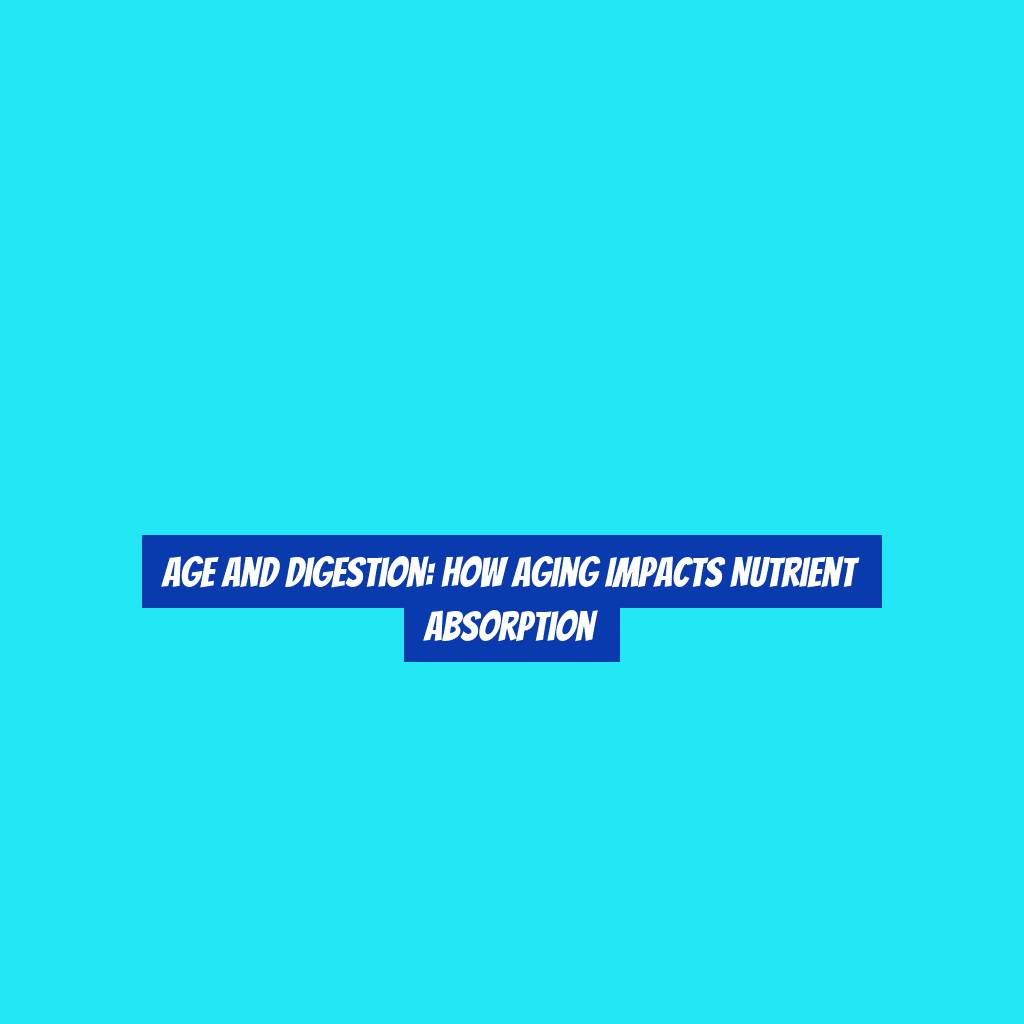Age and Digestion: How Aging Impacts Nutrient Absorption
As the saying goes, G??You are what you eat.G?? But as you age, your bodyG??s ability to absorb and utilize nutrients from food may not be as efficient as it once was.
Have you ever wondered how aging impacts the way your body digests and absorbs essential nutrients? Understanding the changes in digestive function and their effects on nutrient absorption is crucial for maintaining optimal health as you grow older.
So, what exactly happens to your bodyG??s ability to extract vital nutrients from the foods you consume as you age?
Aging and Changes in Digestive Function
As you age, your digestive function undergoes changes that can affect nutrient absorption. One of the primary changes is a decrease in the production of stomach acid and digestive enzymes. This reduction can lead to difficulties in breaking down and absorbing certain nutrients, such as vitamin B12 and calcium. Additionally, the muscles in the digestive tract may weaken, causing food to move more slowly through the system and potentially leading to constipation. These changes can impact the absorption of essential nutrients, potentially leading to deficiencies if dietary adjustments arenG??t made.
Furthermore, age-related changes in the gastrointestinal tract can also affect the absorption of fat, which is important for the uptake of fat-soluble vitamins like A, D, E, and K. The decrease in bile production and alterations in bile composition can hinder the efficient breakdown and absorption of dietary fats. As a result, maintaining a well-balanced diet that includes sources of healthy fats becomes increasingly important as you age to support optimal nutrient absorption.
Effects on Nutrient Absorption
Due to the age-related changes in your digestive function, the effects on nutrient absorption become increasingly significant as you get older. As you age, various factors can impact your bodyG??s ability to absorb essential nutrients, leading to potential deficiencies and health issues.
-
Decreased stomach acid production: With age, your stomach may produce less gastric acid, which is essential for breaking down food and absorbing nutrients like vitamin B12 and calcium.
-
Reduced enzyme production: Enzyme production in the pancreas and small intestine may decline, affecting the digestion and absorption of carbohydrates, fats, and proteins.
-
Altered intestinal motility: Aging can lead to changes in the muscles of the digestive tract, potentially slowing down the movement of food and reducing nutrient absorption.
-
Impaired nutrient transport: Age-related changes in the cells lining the intestines may affect the transport of nutrients into the bloodstream, impacting overall absorption.
These factors emphasize the importance of maintaining a nutrient-dense diet and considering supplementation as you age to support optimal nutrient absorption and overall health.
Common Nutrient Deficiencies in Older Adults
Common nutrient deficiencies in older adults can significantly impact overall health and well-being. As you age, your body may become less efficient at absorbing essential nutrients, leading to a higher risk of deficiencies.
One common deficiency among older adults is vitamin D. This is often due to spending less time outdoors and having reduced skin thickness, which affects the bodyG??s ability to produce vitamin D from sunlight. A deficiency in vitamin D can lead to weakened bones, decreased immune function, and an increased risk of certain chronic diseases.
Another common nutrient deficiency in older adults is vitamin B12. As you age, your bodyG??s ability to absorb vitamin B12 from food decreases, leading to potential deficiencies. Vitamin B12 is crucial for maintaining healthy nerve function and producing DNA. Deficiency in this vitamin can result in anemia, nerve damage, and even cognitive impairments.
Furthermore, older adults are at a higher risk of inadequate calcium intake, which is essential for bone health. Inadequate calcium levels can lead to conditions such as osteoporosis, increasing the risk of fractures and reducing overall mobility.
ItG??s important to be mindful of these common nutrient deficiencies as you age and to ensure that your diet includes sufficient amounts of essential nutrients or consider supplementation under the guidance of a healthcare professional.
Strategies for Supporting Digestion in Aging
With aging, your bodyG??s ability to absorb essential nutrients may decrease, making it important to consider strategies for supporting digestion and nutrient absorption in older adults.
Here are some effective ways to support digestion as you age:
-
Balanced Diet: Ensure your meals contain a variety of nutrient-dense foods, including fruits, vegetables, lean proteins, and whole grains. This can help provide the necessary nutrients for optimal digestion and absorption.
-
Hydration: Stay adequately hydrated to support the digestive process. Water helps in the breakdown of food and the absorption of nutrients.
-
Regular Physical Activity: Engage in regular physical activity to promote healthy digestion. Exercise can aid in maintaining muscle tone in the digestive tract and help prevent constipation.
-
Probiotics and Digestive Enzymes: Consider incorporating probiotic-rich foods or supplements into your diet to support gut health. Additionally, digestive enzyme supplements may help in the breakdown and absorption of nutrients, especially for individuals with decreased enzyme production.
Importance of Nutrient-Rich Diet for Seniors
Ensuring seniors maintain a nutrient-rich diet is crucial for supporting their overall health and vitality as they age. As you grow older, your bodyG??s ability to absorb essential nutrients becomes increasingly important. A diet rich in vitamins, minerals, fiber, and healthy fats can help mitigate the impact of aging on digestion and nutrient absorption.
Nutrient-dense foods such as fruits, vegetables, lean proteins, whole grains, and dairy products can provide the necessary fuel for your body to function optimally.
Adequate intake of nutrients like calcium, vitamin D, and B vitamins becomes more critical with age, as they play a significant role in maintaining bone health, cognitive function, and energy levels. Additionally, a diet high in antioxidants from sources like berries, nuts, and leafy greens can help combat oxidative stress and inflammation associated with aging.
Furthermore, a nutrient-rich diet can support immune function, cardiovascular health, and weight management, all of which are essential aspects of healthy aging. By prioritizing a diverse and balanced diet, you can ensure that your body receives the necessary nutrients to thrive in your later years.
Conclusion
As you age, changes in digestive function can impact nutrient absorption, leading to common deficiencies in older adults.
However, by focusing on a nutrient-rich diet and implementing strategies to support digestion, you can help mitigate these effects.
ItG??s important to be mindful of the changes in your body as you age and take proactive steps to ensure youG??re getting the nutrients you need for optimal health and well-being.

